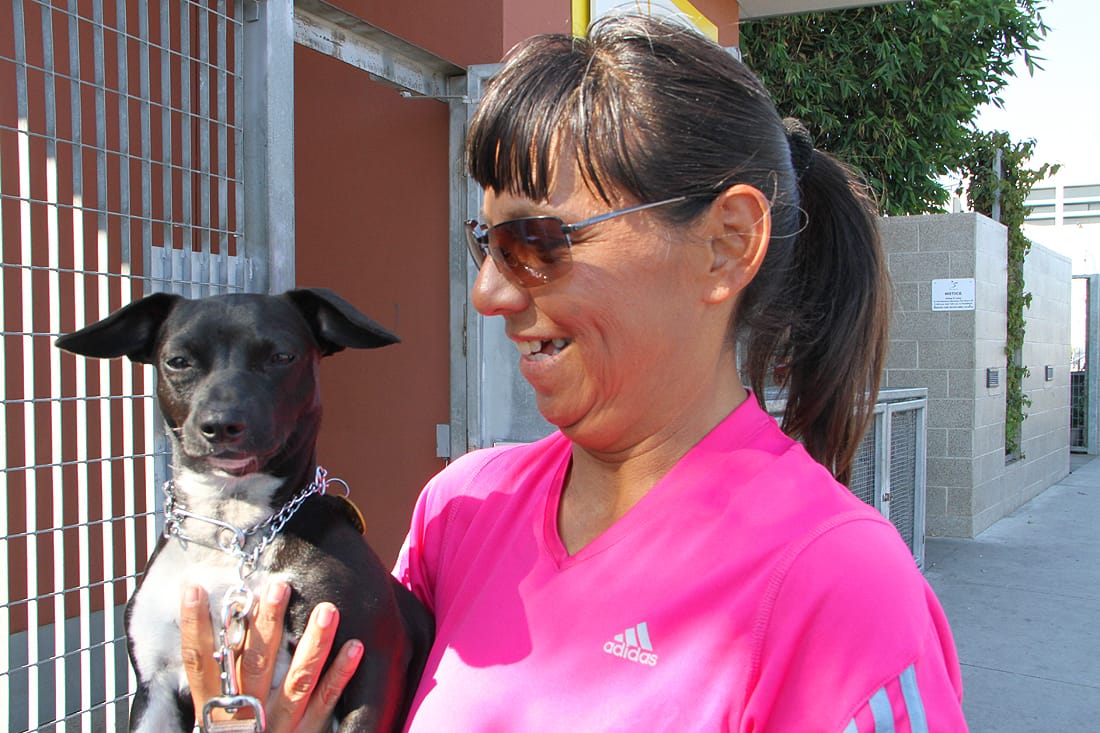
DOWNTOWN —Wearing a hot pink shirt, jeans and matching pink sneakers and standing in front of OPCC Monday afternoon, Maria Lieske, 45, bent down to see what her part-terrier/dachshund/pitbull wanted.
Boots, whom she's owned for a few months, was wriggling around in front of her carrier. Lieske opened the door and Boots bounced inside to grab a mouthful of dog treats.
"Oh, you wanted some treats!" Lieske said, laughing.
The puppy, named for its two front white paws, is a rescue dog Lieske adopted from a couple at OPCC, Santa Monica's leading homeless services provider. Lieske has been homeless almost four years and arrived in Santa Monica last year from Minnesota. She said strangers come up to her and tell her Boots is "so cute."
"She just lost her baby teeth," Lieske, who carries nail clippers and other dog care items with her, said.
Like Boots, pets provide companionship to those living on the streets, with some homeless taking even better care of the animals than themselves. Homeless pets have a lot of options in the form of veterinarians and nonprofits who cater to their medical needs for free. Moreover, most of the shelters around town also allow pets inside their facilities.
There are 780 homeless in Santa Monica, up from 740 and 769 in 2011 and 2012, respectively, according to the 2013 Santa Monica Homeless Count numbers.
John Maceri, executive director of OPCC, said when homeless are abandoned by family or friends, animals are the only "consistent thing" in their lives. At OPCC, clients are allowed to bring their pets into the facilities that include Samoshel, Turning Point, Safe Haven and Daybreak Day Center, Maceri said.
He said the nonprofit does require the pets be attended by their owners or friends at the shelter. OPCC eventually hopes to move people into permanent housing, where pets are also welcome, he said.
"I think animals are very therapeutic and what we have found in our facilities, when they're well cared it can be a huge boost not only for the person who has them but also for the other residents as well," Maceri said. "I think it adds a sense of calm. Animals give you unconditional love. People are often bonded with their animals."
There isn't a lot of police enforcement needed when it comes to homeless pets, Santa Monica police officer Jacob Holloway said. He has been part of the SMPD's Homeless Liaison Program for the past seven years.
"As a police perspective with regards to enforcement I want to make sure people have their dogs registered and they are well taken care of," he said in an e-mail. "Some of the problems I've run into when trying to help homeless folks is when a person wants to travel, that most buses won't take the animal unless it is a service animal."
He said he's noticed homeless individuals with pets are much more social because everybody wants to come pet their animals.
"Most homeless people seem to have very happy, healthy pets as they are outdoors much of the time," Holloway said.
At the Santa Monica Animal Shelter, staff assistant Karen Bishop said less than 10 percent of animals are turned in by their homeless owners. She said for example, some homeless pets may have a chronic off-leash problem so their owners ask the shelter to find the animals a home.
"It's very rare. Most homeless take care of their pets better than themselves," Bishop said. "They're the most socialized animals."
She said, depending on the case and situation, the shelter can waive license fees for dogs if they're spayed or neutered. The fees usually run between $35 to $75. She said the shelter also gives out information on low-income or free vet care to the homeless.
For service dogs, she said the shelter has to ask about the task the animal provides.
"If it meets the requirement for the Americans with Disabilities Act, then we will go ahead and issue a service dog tag," she said. "It's popular to say they have a service dog but when we ask further questions, we find out it's a therapy dog. Service dogs provide a service that normally the person with the disability normally wouldn't be able to do."
Holloway recently referred Carol Vogelman to Hope Veterinary Center for her Italian greyhound, Mademoiselle Fifi, whom she called a "licensed service dog." The center offers free routine vet care, physical exams, vaccines, surgery and more. Fifi, clad in a white T-shirt, has many outfits including a crowd favorite, a Mickey Mouse sweatshirt, her owner said.
Vogelman said she got Fifi seven years ago when she had to stay indoors for four months for medical reasons. Vogelman, who became homeless in 2009, said dogs provide needed companionship.
"She knows when she can't protect me," Vogelman said, standing outside the OPCC Access Center. "If I have a severe attack of pain, she gives me space."
The Jones Animal Hospital on Olympic Boulevard has been offering free vaccinations for homeless pets for more than two decades, Suzann Jones, co-owner of the hospital on Olympic Boulevard, said.
She said they also offer free exams and Ivermectin injections for dogs if they have mange, a type of skin disease. For puppies, the hospital offers a series of rabies exams at four months, then at 1-year old and three years after that, she said.
"It's easier to vaccinate so they don't get sick," Jones said. "It's preventative, just vaccinate them."
Homeless people keep pets just like others keep pets, Holloway said.
"They want companionship," Holloway said. "They relieve stress, they're cute."
ameera@www.smdp.com

